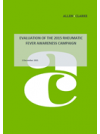The Ministry of Health contracted Allen + Clarke Policy and Regulatory Specialists Limited (Allen + Clarke) to carry out an evaluation of the 2015 Rheumatic Fever Awareness Campaign. This evaluation will help to improve the 2016 Rheumatic Fever Awareness Campaign, in support of the overarching Rheumatic Fever Prevention Programme (RFPP).
Overall the evaluation found that the campaign was efficient, effective and relevant.
- The campaign achieved excellent value for the level of investment.
- The campaign also had excellent alignment with other rheumatic fever prevention activities, and the campaign activities and timing allowed for use of the materials.
- The campaign exceeded the expected level of reach amongst target audiences, with nearly all (95 percent) of the target audience having seen/heard the campaign.The television advertisements and posters were the mechanisms with widest reach, with 90 percent of the target audience reached by these two mechanisms alone.
- The campaign supported a good understanding of the association between sore throats and rheumatic fever.For example, the telephone survey found that 82 percent of the target audience understood that ‘a sore throat can cause rheumatic fever’ and that 92 percent understood that ‘rheumatic fever can damage your heart’.
Purpose
The purpose of this evaluation was to provide independent advice to inform improvements to the 2016 Rheumatic Fever Awareness Campaign in support of the overarching Rheumatic Fever Prevention Programme.
The objectives of the evaluation were to: assess the relevance of the 2015 campaign resources; the efficiency of the campaign in terms of alignment with other key activities and overall value; and the effectiveness of the campaign resources in improving awareness and understanding of key rheumatic fever messages. These key campaign messages focused on the link between sore throats and rheumatic fever, the importance of getting sore throats in at-risk children checked by a health professional, and the importance of completing the full antibiotic course for children who have Group A Streptococcus infection.
Methodology
The evaluation was informed by 8 documents, a review of 47 curriculum materials as well as call statistics to Healthline (New Zealand’s national telephone triage and health service), 12 interviews with key stakeholders including the Health Promotion Agency (HPA), Ministry of Health (MOH), GSL Promotus and DHBs, 8 focus groups of Māori or Pasifika families in 5 regions, 257 telephone interviews with the target audience and a workshop with key stakeholders. This evidence was assessed against a set of standards, established as part of the evaluation process and agreed by key stakeholders.

